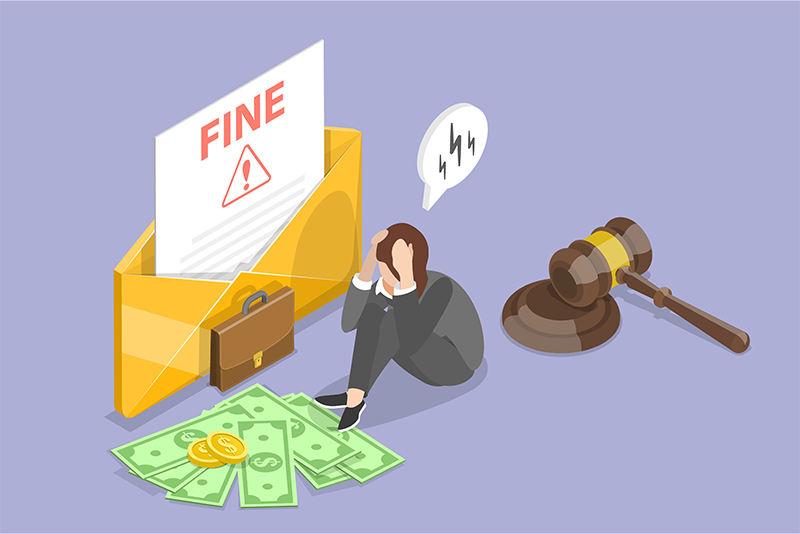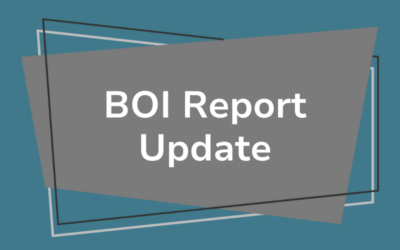By now, you’ve hopefully heard about the beneficial ownership information report that many businesses must file before the year’s end. The BOI report is filed with the Financial Crimes Enforcement Network (FinCEN) and it is designed to document information about the owners of companies within the USA.
Businesses that are required to file BOI reports are called reporting companies and they meet certain reporting due dates depending on when they were created or registered. Reporting companies that do not file a BOI report by their due date are subject to severe civil and criminal penalties, including steep fines and jail time.
In this article, I’ll summarize the penalties, fines, and jail time associated with incorrect BOI reporting.
A Recap on BOI Reports Requirements
A BOI report is a document that names and provides information about those who own, control, and benefit from a company. FinCEN began requiring the report to make it harder for dishonest people to benefit from gains earned illegally through shell companies or other questionable ownership arrangements or business tactics. FinCEN will securely maintain the information, which under certain circumstances will be made available to government officials who need it for national security or to enforce laws.
Here are the most important things to know about BOI reporting:
- If your business was formed in the United States at a Secretary of State (or comparable agency), your company may be required to submit a BOI report before the end of the year. If you’re not sure if your company is required to file a report, you can learn more in an earlier blog post we published titled “What Is a BOI Report and Do You Need to File One?”
- In the report, you’ll be asked to provide information about the company and its beneficial owners. Beneficial owners include anyone who has direct or indirect control over the company, claims at least 25% of ownership in the business, or has both control and at least 25% of ownership.
- Anyone within a reporting business who meets those qualifications is considered a beneficial owner and must provide information including their legal name, address, and date of birth. A personal identification number and photo ID are also required.
- You’ll also have to provide information about the business, DBAs or trade names, the company’s address, where it was formed, and an IRS taxpayer ID.
Latest BIO reporting due dates:
- For the vast majority of reporting companies, the new deadline to file an initial, updated, and/ or corrected BOI report is now March 21, 2025. FinCEN will provide an update before then of any further modification of this deadline, recognizing that reporting companies may need additional time to comply with their BOI reporting obligations once this update is provided.
- Reporting companies that were previously given a reporting deadline later than the March 21, 2025 deadline must file their initial BOI report by that later deadline. For example, if a company’s reporting deadline is in April 2025 because it qualifies for certain disaster relief extensions, it should follow the April deadline, not the March deadline.
- As indicated in the alert titled “Notice Regarding National Small Business United v. Yellen, No. 5:22-cv-01448 (N.D. Ala.)”, Plaintiffs in National Small Business United v. Yellen, No. 5:22-cv01448 (N.D. Ala.)—namely, Isaac Winkles, reporting companies for which Isaac Winkles is the beneficial owner or applicant, the National Small Business Association, and members of the National Small Business Association (as of March 1, 2024)—are not currently required to report their beneficial ownership information to FinCEN at this time.
Do not delay in submitting your report:
- I cannot stress enough the importance of filing before the deadline.
- Since it’s the first year for filing these reports, processing delays are possible and you could encounter penalties if you wait until the last minute.
- If you’re planning on using a professional service provider to help you file, you should expect their rates to increase as the deadline approaches, so file sooner than later.
File Your BOI Report With CorpNet
CorpNet can file your BOI report for you, which will help you file on-time and with the right information. Our filing experts are here to keep you and your business compliant.
Failing to Comply With BOI Reporting Requirements
Business owners should know that FinCEN is serious about BOI reports and has strict penalties for anyone who provides false information or fails to file a report.
Providing False Information
You can read more enforcement provisions in the Small Entity Compliance Guide, but the short version is that anyone who purposefully violates the reporting requirements may face civil penalty fines of $591 for each day the violation remains in effect. In addition, willful violation of BOI reporting requirements could be subject to criminal penalties of up to two years in prison and a fine of up to $10,000.
Individuals and corporate entities can both be liable for violating FinCEN’s reporting requirements. If false information is filed, both the person who filed the information and the one who provided the information to the filer can be held responsible. If information is not filed or updated as needed, the business can be held responsible, along with individuals who cause the failure or serve as a senior officer of the business.
Misuse of Information
Another potential area for severe fines and prison time is misuse of information by recipients of BOI reports. Under the Corporate Transparency Act (CTA), FinCEN is authorized to release information contained in BOI reports to six categories of recipients. These include certain federal government agencies, law enforcement agencies, some foreign requesters, U.S. Treasury personnel, appropriate regulatory agencies, and certain financial institutions.
Recipients must satisfy security and confidentiality requirements before they can receive information, and there are strict rules in place for how that information is able to be employed. Any person who gains unauthorized access to information or misuses the information in a BOI report may be subject to civil penalties of up to $591 in fines for each day the violation continues, and criminal penalties of fines not to exceed $250,000. Criminal penalties may also call for imprisonment of not more than 10 years.
If a person accesses unauthorized information or misuses information while also in violation of another law or in a way that displays a pattern of illegal activity, the offender may be subject to enhanced criminal penalties, including a fine of up to $500,000, imprisonment of up to 10 years, or both.
Allowance for Mistakes
While the penalties for knowingly withholding or misusing information or submitting false information are harsh, FinCEN makes some allowances for reports containing inaccurate information if the business owners acknowledge and correct mistakes they’ve made. Penalties may be waived if companies and beneficial owners willingly provide corrected information within 90 days of the deadline for filing.
If the information you provided to FinCEN changes, you’ll need to file an updated report. For instance, if the legal name of the company changes or the company hires a new CEO, an updated report including the new business name or CEO’s information must be provided within 30 days of the change.
Failing to correct inaccurate information or report changes violates reporting requirements and subjects a person and/or the company to the penalties previously discussed.
Protect Yourself and Your Business
A new federal reporting requirement can seem intimidating, and having to file a report with FinCEN may feel like a daunting task. The stakes for doing so are high, however, and the sooner you complete the task, the better, both for your peace of mind and the productivity of your business.
You can access and file your report now at FinCEN’s BOI E-filing website. While FinCEN says it expects that most reporting companies will be able to submit BOI information on their own using the instructions provided, CorpNet can relieve any anxiety you have and file the report on your behalf.
There is a lot to learn about BOI filing, and it’s important that you understand how the report should be made. CorpNet provides a Beneficial Ownership Information Report Fact Sheet to help.
More BOI Information and Resources
- The Purpose of BOI Reporting
- What Is a BOI Report and Do You Need to File One?
- BOI Reporting Requirements by Entity Type
- BOI Filing Requirements: What is Needed?
- Do Inactive Business Entities Need to File a BOI Report?
- Company Applicant vs. Beneficial Owner
- Who Is a Beneficial Owner of a Business?
- Who Is Authorized to File a BOI Report?
- Is the Beneficial Owner Information Report a One-Time or Recurring Filing?
File Your BOI Report With CorpNet
CorpNet can file your BOI report for you, which will help you file on-time and with the right information. Our filing experts are here to keep you and your business compliant.





